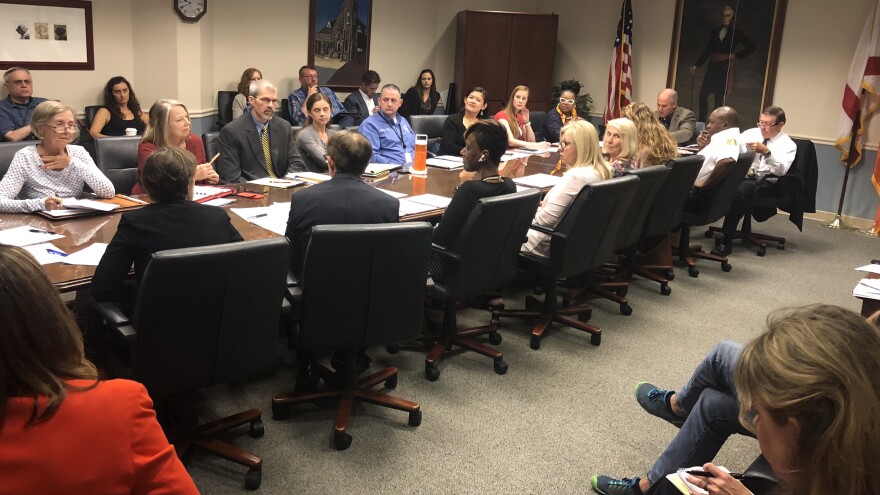It was standing room only in a City Council conference room Thursday morning, the topic on the table: short-term vacation rental properties.
The most popular platform for renting them in Jacksonville is Airbnb, followed by VRBO, 9Flats and HomeAway.
Many short-term vacation rental hosts are technically operating illegally, whether they’re not properly zoned or not paying tourism taxes, with enforcement currently complaint-driven.
City Council President Aaron Bowman has charged a committee with gathering the facts and recommending potential methods for hosts to be required to register with the city, as well as evaluating the city’s code enforcement capabilities and make recommendations regarding enforcing short-term rental regulations.
Committee chair Danny Becton said, “We need to define what a short-term vacation rental business is and once we do that then we say, ‘OK if you’re going to carry out this type of useage then here are the processes.’ “

That led to the committee’s first meeting Thursday where Airbnb hosts we’re seated next to unhappy neighbors, like Avondale resident Lynn Richards who brought petition signatures she’s collected objecting to the short-term rentals.
“We have quite a few signatures here of people who just do not want this in historic side of Jacksonville,” she said.
But Becton said there won’t be a flat out ban. “We can’t make these things illegal. The state has already preempted us in that fact.”
Avondale short-term rental host Rosemary Cate argued a ban would do more harm than good anyway.
“I mean there’s so much economic opportunity to short-term rentals both for hosts and for the city,” she said.
Taxes
One reason the city wants to get involved with regulating short-term rental users is to get its cut of taxes.
Airbnb for example collects the state’s 7 cent sales tax, but not the city’s 6 cent tourist development tax. Airbnb said the app tells hosts they should comply with city regulations, but many hosts at the meeting said they didn’t know they were supposed to be paying additional taxes.
Airbnb says if they city were to come to an agreement with it, it would collect the tourism tax for the city.
Among 39 Florida counties Airbnb had agreements with in 2017, it collected $12.7 million in tourism taxes, also called local bed tax.
Or the city could create a mechanism to collect the taxes on its own. City Council auditor Kyle Billy said the city is probably losing hundreds of thousands of dollars, but there’s no way to know how much for sure.
Homestead Exemption
Another issue: hosts may be illegally claiming a homestead exemption, or too much of an exemption. A homestead exemption refers to a tax break Florida homeowners get on their primary residence.
Property Appraiser Jerry Holland cited state law Thursday saying if a homeowner rents out a property for more than six months, no homestead exemption can be claimed. Or if they rent any portion of their property for more than 30 days for two consecutive years, there’s probably at least a deduction that needs to be made.
Holland said for those renting out a room, his office literally calculates the square-footage rented out and docks it from their exemption.
Of the nearly 2,000 liens issued for homestead noncompliance last year, 20 percent were because of short-term rentals, he said.
These are some of the issues Becton said he’d like to see made simpler.
“We’re hoping to get clarity across the board so we can put it on one sheet of paper,” Becton said. “If you’re going to participate in a business that does short-term vacation rentals, here are the things you need to do. Check every box and you’re golden.”
Zoning
The city’s planning department also talked about the difficulties with zoning, saying short-term rentals don’t neatly fit into any zoning category, so the city is stuck with not regulating them or using the definitions already in city code.
Hotels, for example, aren’t allowed in residential-zoned areas. Bed and Breakfasts are only allowed in historic areas and it has to be the owner’s primary residence.
The easiest fit for short-term rentals in current code lies under the rules for dwellings, or residential homes. Those are allowed to be rented out, but it must be for at least a week at a time. If guests stay for a shorter length of time, such as a weekend, it’s considered to be acting as a hotel, which is illegal and could result in a fine.
Becton intends to define what a short-term rental is.
Later this month the committee will meet again and focus on hearing from the short-term rental industry.
The committee is tasked with reporting its findings and recommendations to the full City Council by April 30.
Reporter Lindsey Kilbride can be reached at lkilbride@wjct.org, 904-358-6359 or on Twitter at @lindskilbride.




